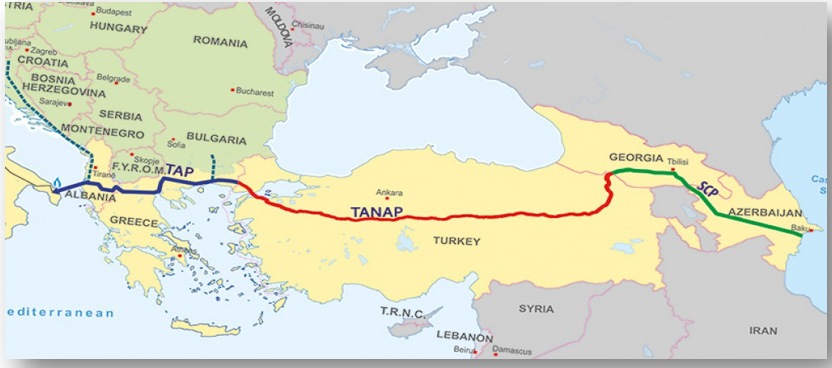Azerbaijan Strengthens Commitment to Double Gas Exports to Europe
Recent Articles
Author: Toghrul Ali
03/08/2024
Doubling gas exports from Azerbaijan to the European Union (EU) has been a primary focus of the energy partnership between both parties. Azerbaijan has been working closely with the European bloc to reach its pledge of increasing its gas supply to Europe to approximately 20 billion cubic meters (bcm) per annum by 2027. The Southern Gas Corridor (SGC), a vital route for Europe's energy diversification, has assumed an increasingly significant role in fulfilling this commitment.
Expanding the capacity of the SGC was discussed during the 10th Ministerial Meeting of the SGC Advisory Council. Representatives from 23 countries met in Baku on March 1, where joint exploration, energy diversification, and the transition to renewable energies were discussed. To meet the growing demand, participants discussed the development of “infrastructure and gas fields to further increase gas supplies from Azerbaijan to the EU.”
Since last year’s Advisory Council meeting, several important developments have taken place in expanding the SGC’s capacity and reach. In 2023, Azerbaijan started supplying natural gas to two more European countries - Hungary and Serbia. Currently, Azerbaijan supplies gas to a total of eight countries (Georgia, Türkiye, Italy, Greece, Bulgaria, Romania, Hungary, Serbia).
The EU has been working towards increasing its imports from alternative producers such as Azerbaijan. European companies have been working to upgrade and expand the SGC in efforts to ween off Russian gas supply and prevent energy shortages in the colder months. In late February 2024, UK BP started gas production at another development cluster in its Shah Deniz field complex off the shore of Azerbaijan as part of the field’s $28 billion second development phase. The same month, BP also announced that it is getting closer to producing oil at the next phase of development of the Azeri-Chiraq-Guneshli (ACG) offshore oil project, which helps supply the SGC. Amidst Europe's quest for alternative energy sources, these advances have the potential to enhance the energy security of southern and southeastern European countries, which have traditionally relied on Russia for their energy needs.
Deputy Assistant Secretary of the U.S. State Department’s Bureau of Energy Resources (ENR) Kimberly Harrington attended the meeting and said that, “the U.S. government is very proud of the role that it had for over a decade in supporting the SGC and, of course, its final stages of becoming fully operational in 2020.” Emphasizing SGC’s role in diversifying Europe’s gas supplies, Harrington added, “We'll continue to really support these efforts. And we think this expansion of Azerbaijani gas is going to make a difference for a lot of countries.”
The SGC has been operational since 2020, serving as a key natural gas supply route from the Caspian Sea to European markets. It consists of interconnected pipelines, including the South Caucasus Pipeline, the Trans-Anatolian Natural Gas Pipeline (TANAP), and the Trans-Adriatic Pipeline (TAP), enabling the transportation of gas from Azerbaijan to Italy. In 2023, the SGC facilitated the delivery of approximately 12 bcm of natural gas from Azerbaijan to the EU, marking a significant increase of more than 45% since 2021.
 Source: The Ministry of Energy of Azerbaijan
Source: The Ministry of Energy of Azerbaijan
Top regional, U.S., and European officials, along with representatives from international financial institutions and energy companies, were also in attendance. The meeting particularly showcased the strong dedication of the European Union (EU) and Azerbaijan to their strategic partnership in energy security, encompassing collaboration in not only natural gas supply, but also in renewable energy production, and methane emissions reduction.
The Advisory Council meetings also covered green energy and renewables. When delivering her remarks, Commissioner Simson stressed the evolving nature of the energy partnership between the EU and Azerbaijan, “In 2019, there was only gas on the horizon. Not today, the Southern Gas Corridor has evolved to become a forum for cooperation also on renewables and electrification.”
On the sidelines of the Advisory Council meeting, an MoU on wind energy cooperation was signed between the Azerbaijani Renewable Energy Agency and the European industry association WindEurope, via the facilitation of the European Commission. Moreover, several projects and agreements were reaffirmed in the margins of the meetings, including the strategic partnership in green energy development and transmission among Azerbaijan, Georgia, Romania, and Hungary. As the EU and Caspian region countries work together to untap the region’s promising renewable energy potential, further advancement of existing energy routes such as the SGC provides an opportunity to develop the so-called “green energy corridor” between the Caspian Sea and Europe.
Azerbaijan's hosting of the upcoming United Nations Climate Change Conference (COP-29) has garnered significant global attention and interest toward the country. With support from and cooperation with Western partners such as the EU and the U.S., Azerbaijan has a unique opportunity to spearhead a climate change agenda not only domestically, but also throughout the Caspian region.